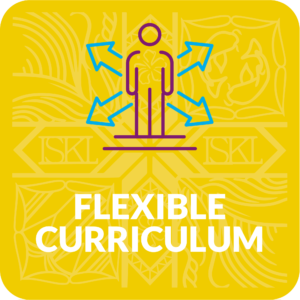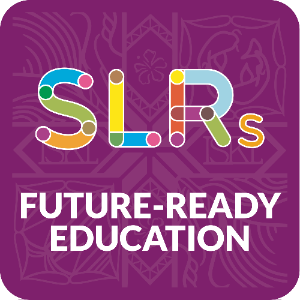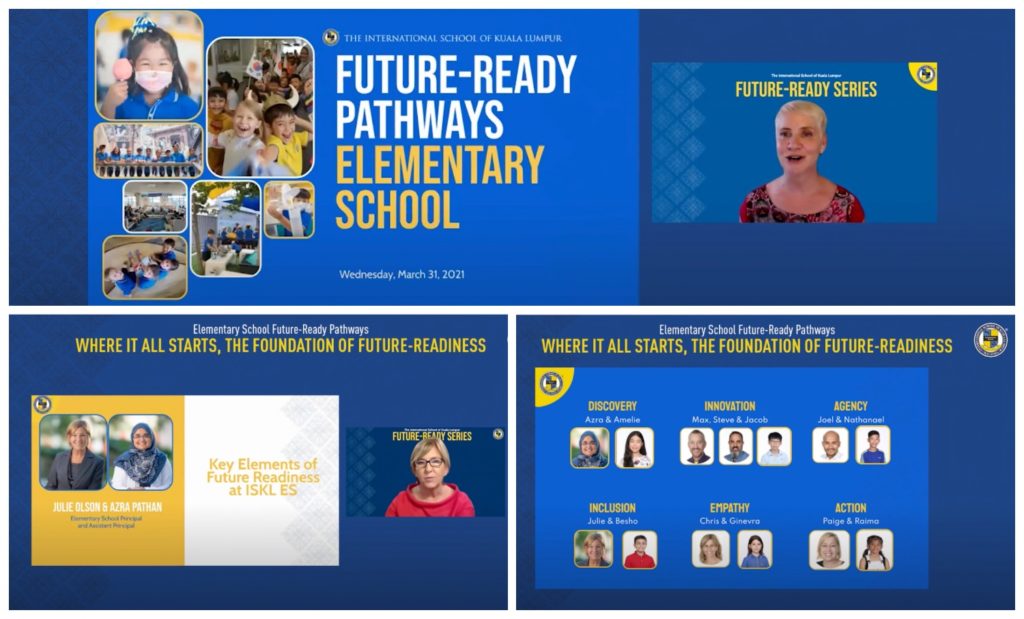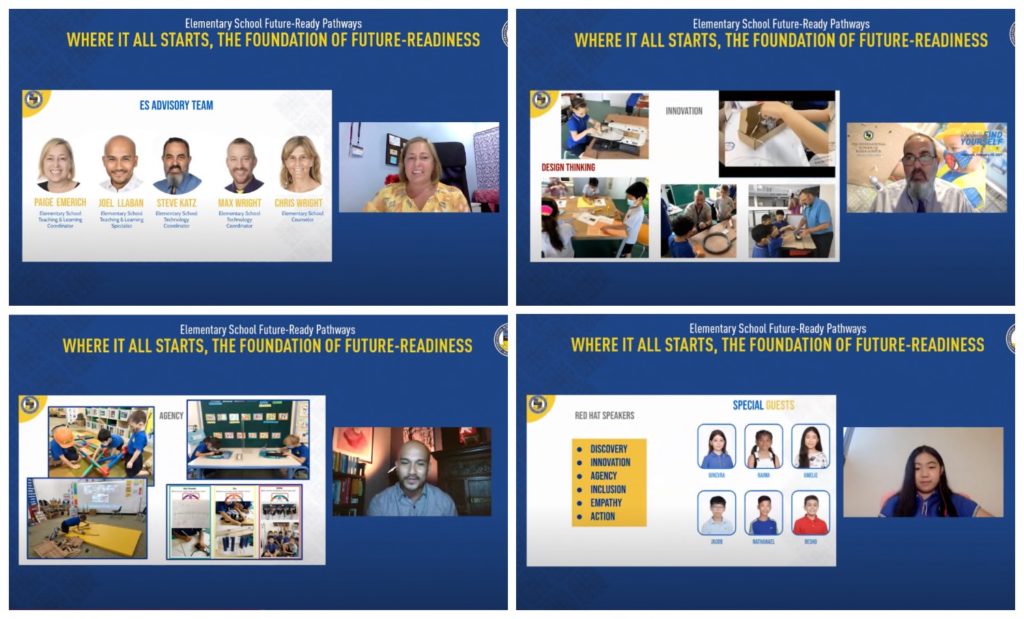
 Holistic education is not just about gleaning information obtained from textbooks in school but also about enabling students to think creatively, reason critically, communicate effectively, and equip themselves for their life journey.
Holistic education is not just about gleaning information obtained from textbooks in school but also about enabling students to think creatively, reason critically, communicate effectively, and equip themselves for their life journey.
In the last of The International School of Kuala Lumpur’s (ISKL) Future-Ready Pathways series, parents and students were invited to find out more about the Elementary School (ES) approach in an online forum entitled “Where it all starts, the foundation of future readiness.” Held on March 31, it hosted six engaging, interactive breakout room sessions, which gave participants a chance to interact with the students and co-facilitators.
Rami Madani, ISKL’s Head of School, started the forum by elaborating on what differentiates a future-ready student.
“In line with the school’s Mission and Vision, we prepare students for the future, regardless of their age, to help them transform conditions for themselves and other people as well as the environment,” he said. Rami affirmed that the school also developed passion and competencies in areas that made a difference in the world by creating innovative, inclusive programs and learning pedagogies that were personal and authentic.
In her opening remarks, ISKL Director of Technology Charlotte Diller also mentioned that ISKL, being known for its excellence in international education as a forward-thinking and future-ready school, is committed to sharing learning and simulating discussions on education for both ISKL and the wider community.
“The learning and development that takes place in Elementary School lay the foundation for developing the young learners’ attitude, skills, knowledge, and understanding. The ES team is very intentional about how they teach students in understanding knowledge, not just by absorbing it but also by offering relevant and learning opportunities to our youngest learners so that they can start their education and life journey with solid and value-driven foundations,” Charlotte remarked.
Next, ISKL’s Elementary School Principal Julie Olson and Assistant Principal Azra Pathan shared the six key elements that form the cornerstone of future readiness at ISKL: Innovation, Agency, Empathy, Action, Discovery, and Inclusion.
These elements were founded by the ISKL ES Advisory team (composed of ES Teaching and Learning, Edu-Tech, and Counselling teams), who work together to develop future-ready practices. Together with the help of ES Grade 5 students Ginevra, Raima, Amelie, Jacob, Nathaniel, and Besho, they each presented the six elements to give participants an overview of life in Middle School.
Beginning with Discovery, Azra explained that this was an excellent opportunity for experiential learning and challenged students to use their imagination and creativity. “In this place, students co-construct meaning together in a social environment that allows them to apply their learning and visit concepts through the lens of inquiry,” said Azra, adding that students could generate ideas and solutions that may change the world simply through play.
Grade 5 student Amelie further elaborated by saying that Discovery was about being creative and a chance to collaborate with friends, saying that “Discovery prepares us for the future. We need to ask questions and take risks to be able to create something.”
ISKL Elementary School Technology Coordinator Max Wright shared how Innovation is a vital component of progress across all industries, including education. He said: “It is especially significant, considering how the young minds molded by the education system today will be leading the charge for innovation tomorrow.” He added that students are encouraged to explore new concepts, look at challenges from all angles and embrace failures as opportunities to try again.
ISKL Elementary School Technology Coordinator Steve Katz agreed, saying Innovation goes beyond technology and traditional learning spaces. In the Zoom breakout session on Innovation, Grade 5 student Jacob gave a personal account of how science experiments inspired innovative ideas and integrated technology.
Joel Jr Llaban, ISKL’s Elementary Learning Specialist and Instructional Coach spoke about Agency – where learners have the power to act and include learning engagements and initiative. He explained: “Agentic learning is defined by self-directed actions, aimed at personal growth and development based on self-chosen goals. Within this context, students initiate actions and drive their learning.”.
Grade 5 student Nathaniel shared that Agency was about choosing your path, being independent, and self-reliant. “Instead of relying on others, we have to learn to rely on ourselves and make good choices so that we can be role models to the younger ones at ISKL, and as you get older, all that comes with more responsibility.”
Inclusion speaks to the heart of ISKL’s values, which goes with the belief that children learn when they feel included, shared Julia Love, who is also ISKL’s Director of Admissions. Inclusion aims to provide all individuals access to learning along with a rich school experience, irrespective of race, gender, or ability.
Grade 5 student Besho further identified the three fundamental values of access based on the idea that everyone has the same opportunity, a sense of belonging, and a sense of having something in common. And diversity only helps in valuing all differences.
Chris Wright, ISKL’s Elementary School counselor, explored the element of Empathy-which goes beyond just being kind to someone. It is also about understanding and sharing emotions and experiences.
“At ISKL, we focus on helping students develop self-regulation and self-awareness skills to help them realize how their actions impact others around them. This helps students build openness that is necessary for collaboration with others from diverse backgrounds and experiences, allowing them to be more effective future-ready passionate leaders.”
In her own words, Grade 5 student Ginevra described Empathy as the ability to put oneself in someone else’s shoes and understand how they feel. “When I understand myself better, this allows me to understand others,” she said, sharing how it was necessary to see things from the other person’s perspective in order to be empathetic.
Paige Emerich, ISKL’s Elementary Teaching and Learning Coordinator talked about the last element – Action. “Living ethically is the pathway that enables students to become Global Citizens, reflected in their ability to develop and synthesize attitudes, skills, knowledge, and understanding that empower them to be contributing and active members of this interconnected world.”
Grade 5 student Raima was more than excited to name a few examples of how ES students had taken action to help others in the community, from fundraising and donating to the Chin refugees and the Dignity for Children Foundation to ‘adopting’ Sun Bears with the Borneo Sun Bear Conservation Center.

“What I’ve learned is that sometimes when you are taking action, you cannot always have things the easy way, and building a voice helps,” she added.
Lastly, it was heart-warming to see the young ISKL students answering enthusiastically to questions in the Q&A session, such as on how the pandemic has impacted future-readiness. In response, the students answered that while it made the learning and experience different, it did not stop them from being committed to Action and Agency, to stay Innovative and kept on Discovering every week, while remaining Inclusive and (being) Empathetic to their classmates.
The event truly gave valuable insight into ISKL’s Elementary School approach to all participants. To watch the entire virtual forum, head over here.
Be a part of ISKL’s family and learn more about its events here.


